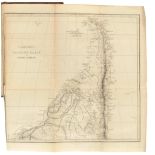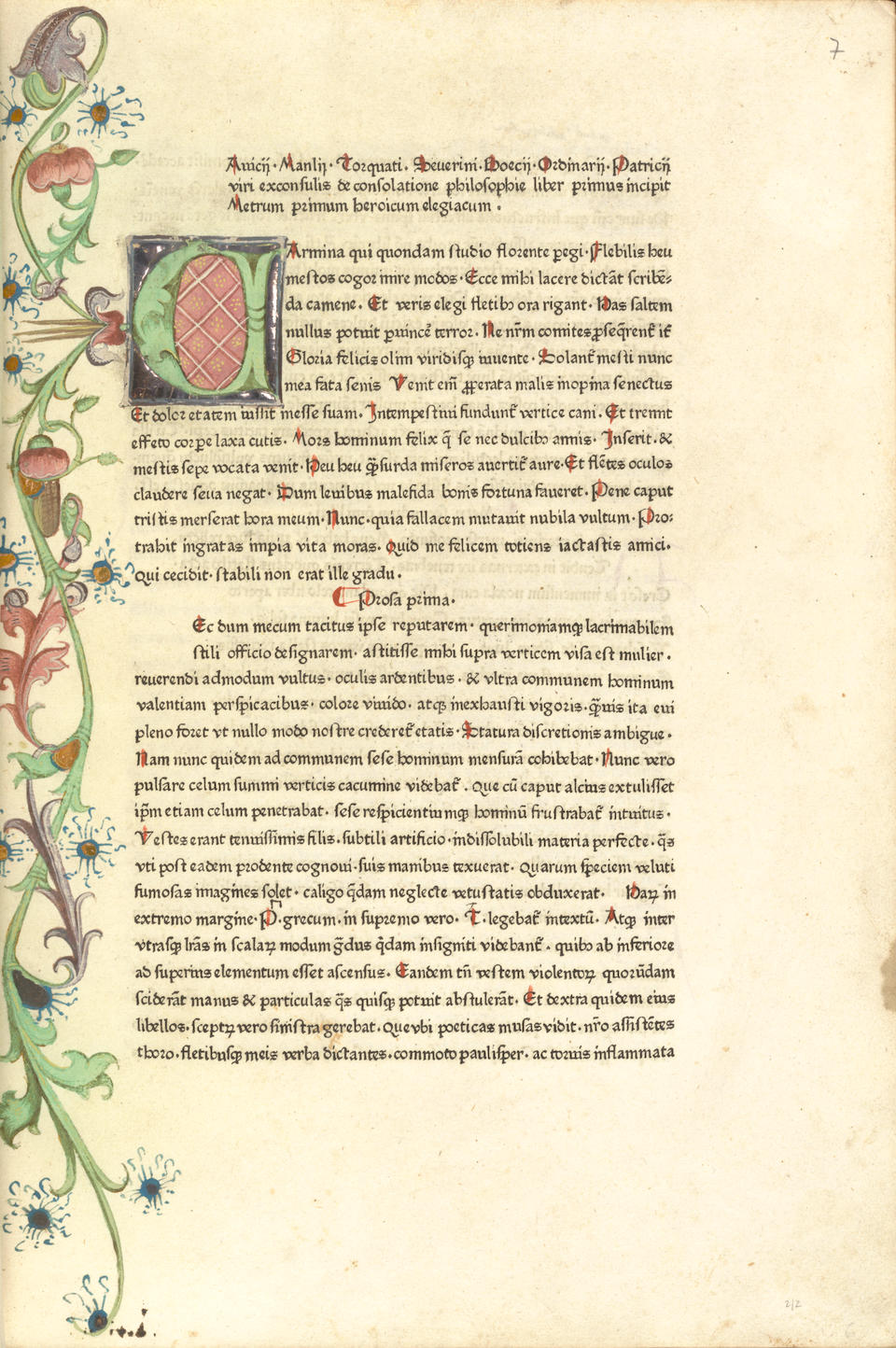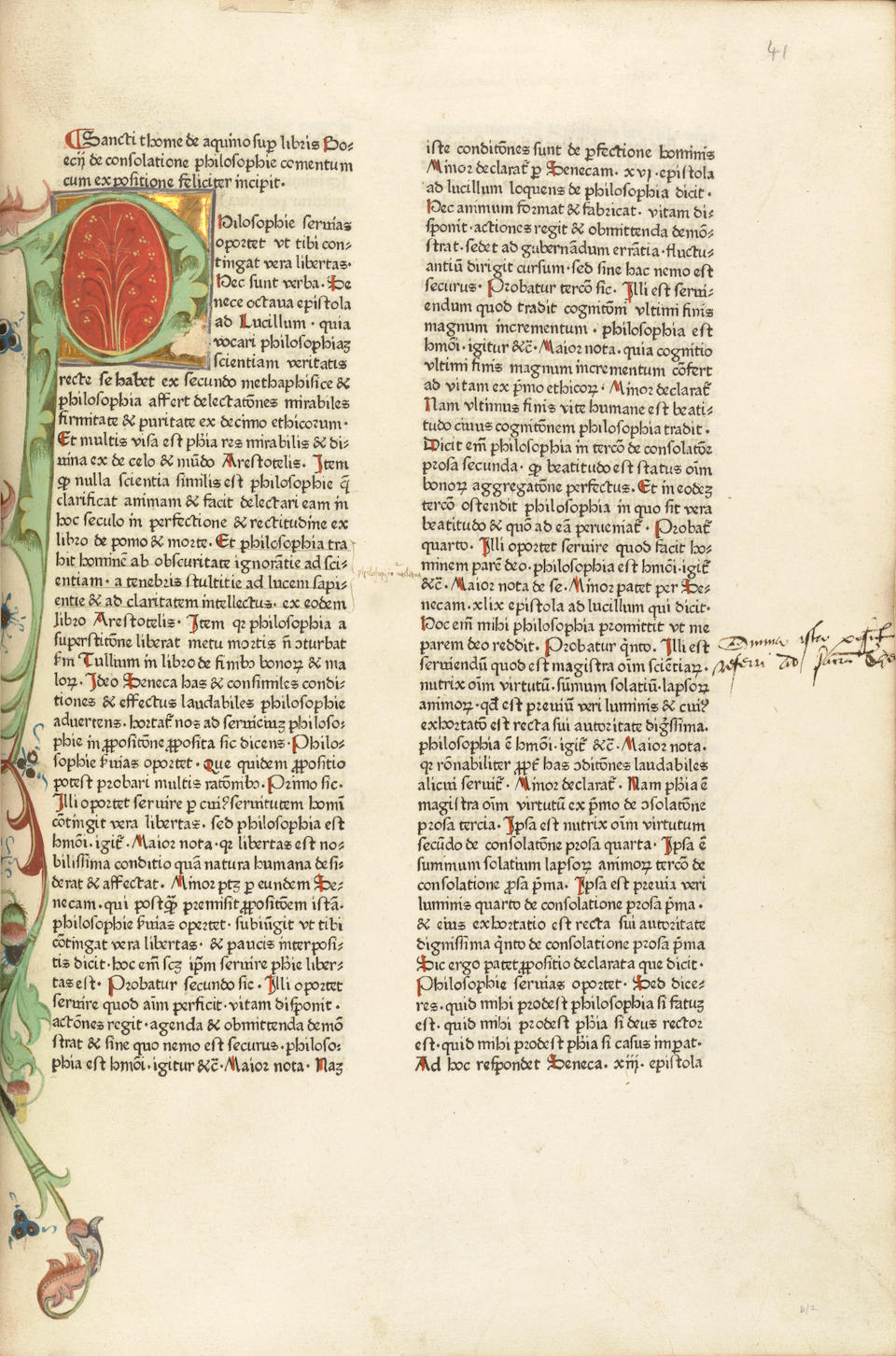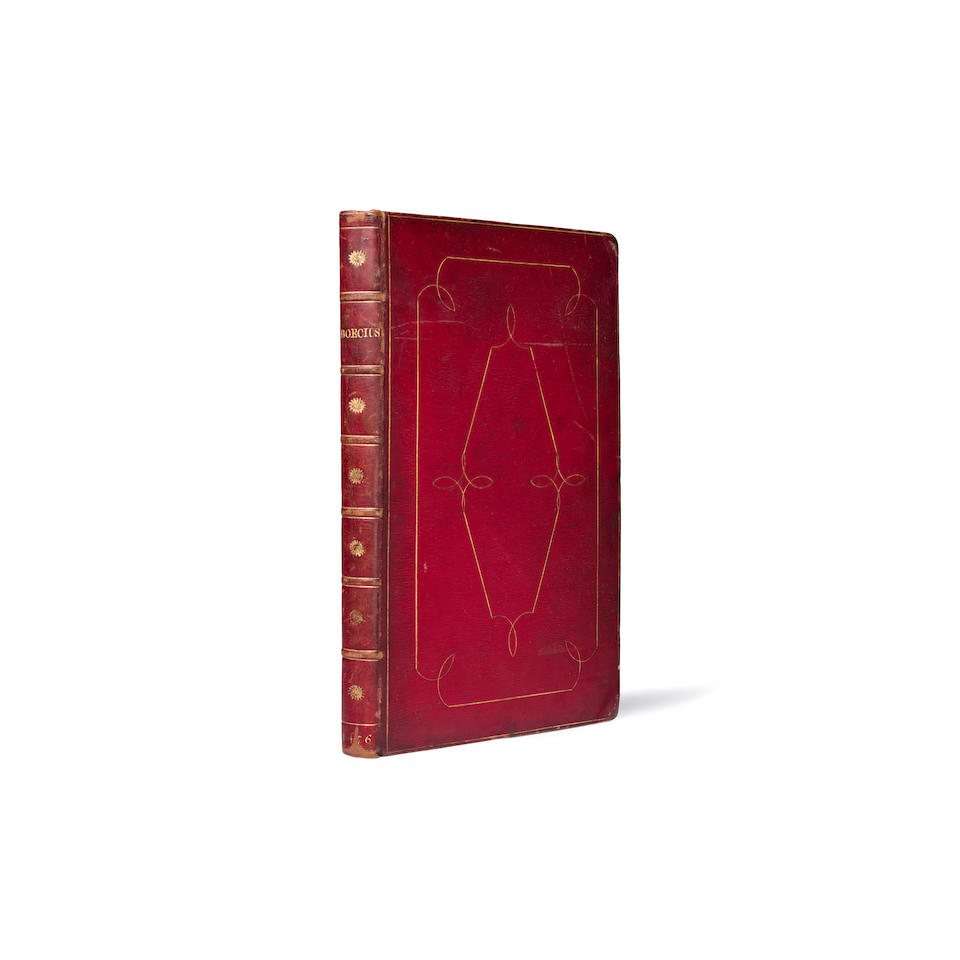4
BOETHIUS, ANICIUS MANLIUS TORQUATUS SEVERINUS. C. 480-524. De consolatione philosophiae. [With...
BOETHIUS, ANICIUS MANLIUS TORQUATUS SEVERINUS. C. 480-524. De consolatione philosophiae. [With commentary ascribed to Thomas Aquinas.] Nuremberg: Anton Koberger, 12 November 1476. 3 parts in one volume, folio (397 x 273 mm). 135 (of 140, without the five blank) leaves. First part in single second and third part in double columns. Type 2:115G (used between 1472-1482). Illuminated by a contemporary artist: leaf 7 with large 6 line initial in pale green and pink, white and yellow pattern, on silver ground, scrolling floral border in light green, blue, red, black and white with gold and silver dots, second initial on leaf 41 in similar design on gold ground, smaller initials, capital strokes and paragraph marks in red, manuscript catchwords. Late 18th-century English red straight-grained morocco gilt, probably by Roger Payne, sides decorated with gilt single fillet border, surrounding two scrolling single fillet frames, spine in six compartments gilt lettered and dated in two others tooled in gilt with single flower-head, gilt edges. Corners of binding slightly bumped, some light darkening. Upper corner of last 3 leaves repaired, a few small stains, second initial slightly rubbed. Provenance: contemporary inscription erased from first page, some marginal annotations (some trimmed by the binder); inscription at end of two parts dated 31 January 1574; Henry S. Harland (bookplate). A BEAUTIFUL EARLY KOBERGER PRINTING OF BOETHIUS'S MASTERPIECE, a large copy with wide margins (preserving the manuscript catchwords) and contemporary illumination, in a red morocco binding probably by Roger Payne. Boethius's Consolation of Philosophy was written circa 523 while he was imprisoned awaiting his execution for treason. The Consolation uses a dialogue between a prisoner himself and a female representation of philosophy, to explore ideas of happiness and the highest good, drawing heavily from Plato, and in particular from the Timaeus. One of the most widely influential texts of the middle ages, the Consolation was the most widely copied secular text throughout the middle-ages. Even today, an astounding 900 manuscript versions are known. Throughout the middle ages and into the renaissance, the Consolation spawned numerous commentaries and was translated widely, into almost every medieval vernacular, but also into Greek and even Hebrew, by some of the greatest translators of the time, including by Jean de Meune and Notker Labeo, as well as Chaucer and Queen Elizabeth. It exerted an enormous influence on Chaucer, and also on writers from Dante to St. Thomas Aquinas. BMC II, 413; BSB B-596; HC *3370; Goff B-771; GW 4526; for the binding see Davenport and Nixon. For further information on this lot please visit Bonhams.com For further information about this lot please visit the lot listing
BOETHIUS, ANICIUS MANLIUS TORQUATUS SEVERINUS. C. 480-524. De consolatione philosophiae. [With commentary ascribed to Thomas Aquinas.] Nuremberg: Anton Koberger, 12 November 1476. 3 parts in one volume, folio (397 x 273 mm). 135 (of 140, without the five blank) leaves. First part in single second and third part in double columns. Type 2:115G (used between 1472-1482). Illuminated by a contemporary artist: leaf 7 with large 6 line initial in pale green and pink, white and yellow pattern, on silver ground, scrolling floral border in light green, blue, red, black and white with gold and silver dots, second initial on leaf 41 in similar design on gold ground, smaller initials, capital strokes and paragraph marks in red, manuscript catchwords. Late 18th-century English red straight-grained morocco gilt, probably by Roger Payne, sides decorated with gilt single fillet border, surrounding two scrolling single fillet frames, spine in six compartments gilt lettered and dated in two others tooled in gilt with single flower-head, gilt edges. Corners of binding slightly bumped, some light darkening. Upper corner of last 3 leaves repaired, a few small stains, second initial slightly rubbed. Provenance: contemporary inscription erased from first page, some marginal annotations (some trimmed by the binder); inscription at end of two parts dated 31 January 1574; Henry S. Harland (bookplate). A BEAUTIFUL EARLY KOBERGER PRINTING OF BOETHIUS'S MASTERPIECE, a large copy with wide margins (preserving the manuscript catchwords) and contemporary illumination, in a red morocco binding probably by Roger Payne. Boethius's Consolation of Philosophy was written circa 523 while he was imprisoned awaiting his execution for treason. The Consolation uses a dialogue between a prisoner himself and a female representation of philosophy, to explore ideas of happiness and the highest good, drawing heavily from Plato, and in particular from the Timaeus. One of the most widely influential texts of the middle ages, the Consolation was the most widely copied secular text throughout the middle-ages. Even today, an astounding 900 manuscript versions are known. Throughout the middle ages and into the renaissance, the Consolation spawned numerous commentaries and was translated widely, into almost every medieval vernacular, but also into Greek and even Hebrew, by some of the greatest translators of the time, including by Jean de Meune and Notker Labeo, as well as Chaucer and Queen Elizabeth. It exerted an enormous influence on Chaucer, and also on writers from Dante to St. Thomas Aquinas. BMC II, 413; BSB B-596; HC *3370; Goff B-771; GW 4526; for the binding see Davenport and Nixon. For further information on this lot please visit Bonhams.com For further information about this lot please visit the lot listing







![[ALCHEMY] ROSICRUCIAN ALCHEMICAL MANUSCRIPT. MYSTERIUM MAGNUM. Illustrated alchemical manuscript...](https://portal-images.azureedge.net/auctions-2024/bonham10938/images/1a54fd62-98f2-4f82-9195-b15d01148e27.jpg?w=155&h=155)




